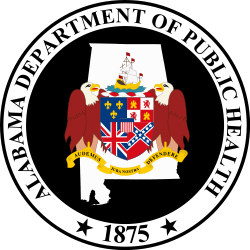The Alabama Department of Public Safety today (April 24, 2019), reported a person with a confirmed case of the measles traveled through Alabama and made a stop in Fort Payne, Al., possibly exposing others to the serious infection.
On April 23, the Tennessee Department of Health reported to the Alabama Department of Public Health that an individual with a confirmed measles case traveled through Alabama on April 11 and made two stops during the infectious period.
Persons should check their vaccine history for vaccination with measles, mumps and rubella (MMR) vaccine. Two doses of vaccine provide up to in 97 percent effectiveness to prevent measles. While measles vaccine given to unvaccinated persons within 72 hours of exposure can prevent disease, it is still appropriate for any unvaccinated person to receive MMR regardless of time of exposure.
On Thursday, April 11, the person later found to have measles stopped at D & J Travel Plaza, 651 Highway 28, W, Livingston, at 2:20 p.m. to purchase food and gas. Then at 5:54 p.m., the person entered at Chick-fil-A, 1824 Glenn Blvd. SW, Fort Payne, to order food.
Measles is a serious viral respiratory illness that lives in the nose and throat mucus of infected people. A single case of measles will infect up to 95 percent of unvaccinated people who are exposed.
State Health Officer Dr. Scott Harris said, “If you suspect you were exposed, it is important for you to call your healthcare provider before being seen in his or her office, follow instructions for reporting, and practice social isolation if you develop any of the signs and symptoms of measles.”
Symptoms of measles appear 7 to 14 days after a person is infected. Common early symptoms include:
- High fever, up to 105 degrees F
- Cough
- Runny nose
- Red or watery eyes
Two to three days after symptoms begin, an infected person may have tiny white spots appear inside of the mouth.
Three to five days after symptoms begin, the infected person could also have:
- A rash of flat red spots appear on the face and spread to the neck, chest, arms, legs and feet.
- Small raised bumps may appear on the flat red spots.
Measles is very contagious and may live up to 2 hours in the air or on surfaces after an infected person coughs or sneezes.
- People can spread measles to others 4 days before and 4 days after the rash appears.
- Measles is spread from person-to-person through
— Coughing and sneezing
— Touching items and surfaces the infected person has coughed or sneezed on. - The best prevention against measles is receiving 2 doses of MMR vaccine.
- If you are exposed, not up-to-date, or have unknown MMR vaccine history, please contact your doctor or pharmacist to get vaccinated.
Measles is highly contagious and can be serious in all age groups. Children younger than 5 years of age and adults older than 20 are more likely to suffer from measles complications. Common complications may include ear infections, hearing loss, and diarrhea. Severe complications may include pneumonia, swelling of the brain, and death. One measles case is also expected to result in 12-18 additional cases. Up to 20-30 percent of infected people have complications from the disease.
According to the Centers for Disease Control and Prevention, about one out of four people who get measles will be hospitalized; one out of 1,000 people with measles will develop brain swelling (encephalitis) which may lead to brain damage; and one or two out of 1,000 people with measles will die, even with the best care. Two doses of measles vaccine are over 97 percent protective against the disease.
For more information on the disease and vaccine, please go to alabamapublichealth.gov/immunization/assets/measles_flyer.pdf or cdc.gov/measles/about/ or contact the ADPH Immunization Division at 800-469-4599.




